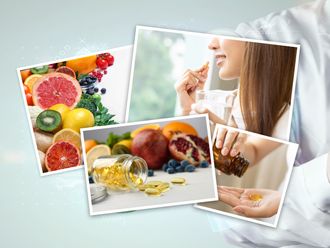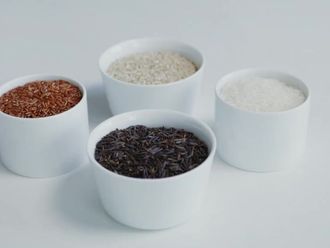
How to lose belly fat? How to lose weight fast without hard-core workouts? Doctors say that the DASH diet is the most effective way to improve your overall condition.
Since the formulation of the DASH diet pattern, it has been studied extensively to look for its effects on multiple other diseases.
Several studies have shown that the DASH diet helps lower blood glucose levels, triglycerides, LDL-C, and insulin resistance.
What does it stand for?
DASH stands for Dietary Approaches to Stop Hypertension. It’s a diet developed specifically to reduce blood pressure in those with hypertension.
But researchers understood later on that this diet resolves tons of other health issues.
What does it do?
It reduces cholesterol, prevents stroke and heart failure, and brings the weight down to a healthy level, even for those with obesity. Plus, it’s considered the best diet to prevent diabetes.
Besides controlling blood pressure, people following it managed to improve insulin resistance.
What DASH diet recommends:
- Fruits and Vegetables: Aim for 4-5 servings each per day
- Whole Grains: 6-8 servings per day.
- Lean Proteins: Include sources like fish, poultry, and legumes.
- 2 or fewer servings of lean meat, poultry, or fish.
- Low-fat dairy: 2-3 servings per day.
- Nuts, seeds, and legumes: 4-5 servings per week.
- Fats and oils: Limit to 2-3 servings per day, focusing on healthy fats.

What’s the background of DASH?
The DASH diet wasn't originally designed for weight loss, but there have been some studies proving that this eating plan can help people get rid of unwanted pounds.
It balances all the necessary nutrients and minerals, like calcium, potassium, protein, and fibre, that are responsible for brain and overall organ function.
It improves the condition of your hair and skin as well. What’s convenient about this diet is that you don't have to calculate and monitor each nutrient: you just need to reduce your salt intake and eat certain recommended foods, for instance, fruits, vegetables, grains, protein-rich foods, and dairy products.
How is it different from other fad diets?
Compared to trendy crash diets, DASH is different. This is a complete lifestyle change. It’s for people who need to take care of their eating habits throughout their lives. There’s no cutting out or starving involved. You can have all sorts of tasty dishes.
7 things to know about the DASH diet
If you’re looking to improve your heart health and overall well-being, the DASH diet might be a great fit:
1. Focus on fruits, vegetables, and whole grains:
This forms the foundation of the DASH diet. These foods are packed with essential vitamins, minerals, and fiber, promoting heart health and keeping you feeling full.
2. Low-fat dairy products:
Include low-fat or fat-free milk, yogurt, and cheese in your diet. These provide calcium and other nutrients crucial for bone health and blood pressure control.
3. Lean protein, in moderation:
Enjoy lean protein sources like fish, poultry, beans, and nuts. Limit red meat and processed meats, which can be high in saturated fat and sodium.
4. Limit added sugars, saturated fats, and sodium:
These can contribute to high blood pressure and other health problems. The DASH diet encourages reducing sugary drinks, processed foods, and excessive salt intake.
5. Potassium powerhouse:
Focus on potassium-rich foods like fruits, vegetables, and potatoes. Potassium helps balance out the effects of sodium in your body, promoting healthy blood pressure.
6. Gradual, sustainable changes:
Don't try to overhaul your diet overnight. The DASH diet is meant to be a sustainable lifestyle change, so incorporate adjustments gradually.
7. Variety is key:
The DASH diet offers a wide range of delicious and nutritious options. Explore different recipes, fruits, vegetables, and whole grains to keep your meals exciting and enjoyable.
DASH diet also recommends the inclusion of certain foods rich in potassium, calcium, and magnesium as these prevent endothelial dysfunction and promote endothelial, smooth muscle relaxation.

Good fats vs bad fats
Fats have been a prime suspect for some time now in the development of the chronic disease epidemic. However, research has now shown otherwise. Fats are now classified as good fats and bad fats.
Good fats prevent inflammation, provide essential fatty acids, and promote overall health. When consumed in moderation, these fats have been shown to increase HDL and lower small dense LDL particles. Some of the sources of good fats also included in DASH include:
- Olive oil
- Avocados
- Nuts
- Hempseeds
- Flax seeds
- Fish rich in omega-3 fatty acids
Bad fats, which include margarine, vegetable shortenings, partially hydrogenated vegetable oils, cause an increase in small LDL particles, which promote atherogenesis.
Fats are a highly condensed source of energy and therefore have to be consumed in moderation. The serving sizes are much smaller than those for other nutrients on the DASH recommendations.
Studies on DASH diet:
Studies include the “DASH Trial”, the DASH-Sodium Trial, and the Meta-Analysis of DASH Diet studies.
Study #1: “A Clinical Trial of the Effects of Dietary Patterns on Blood Pressure” (Journal: NEJM, 1997)
- Authors: Lawrence J. Appel, M.D., et. al
- Among the 133 subjects with hypertension (systolic pressure, >140 mm Hg; diastolic pressure, >90 mm Hg; or both), the DASH diet reduced systolic and diastolic blood pressure by 11.4 and 5.5 mm Hg more, respectively, than the control diet (P<0.001 for each); among the 326 subjects without hypertension, the corresponding reductions were 3.5 mm Hg (P<0.001) and 2.1 mm Hg (P = 0.003).
- A diet rich in fruits, vegetables, and low-fat dairy foods and with reduced saturated and total fat can substantially lower blood pressure. This diet offers an additional nutritional approach to preventing and treating hypertension.
Study #2: Dietary Approaches to Stop Hypertension (DASH): A Healthy Eating Plan for Long-Term Blood Pressure Control (Journal: Hypertension, 1996)
- Authors: Sacks FM, Svetkey LP, Vollmer WM, et al. DASH Study Research Group.
- This landmark study established the DASH diet's effectiveness in lowering blood pressure. It involved a randomized controlled trial where participants followed either a control diet, a fruit and vegetable-rich diet, or a combination of both (DASH diet). The DASH diet group saw significant reductions in systolic and diastolic blood pressure compared to the control group.
Study #3: DASH Diet and Overall Health: A review of the DASH diet and its long-term effects on blood pressure and cardiovascular health.
- Authors: Juraschek SP, Miller ER, Appel LJ. (2017); Hima J. Challa; Muhammad Atif Ameer; Kalyan R. Uppaluri (updated 2023)
- The review analysed various studies investigating the long-term effects of the DASH diet.
- The study concluded that the DASH diet an essential adjunct to pharmacological therapy in metabolic syndromes, a major epidemic in this country.
- It also has been a successful tool in weight management.
- In certain populations, adherence to the DASH diet has shown significant improvements in the control of type 2 diabetes.
- It is a preferred diet in patients with heart failure due to its emphasis on reducing dietary sodium and encouraging the intake of potassium, magnesium, and calcium.
These are just a few examples, and ongoing research continues to explore the potential benefits of the DASH diet.
Remember: Talk to your doctor or a registered dietitian before starting any new diet, especially if you have pre-existing health conditions. They can help personalize the DASH diet to fit your specific needs.










